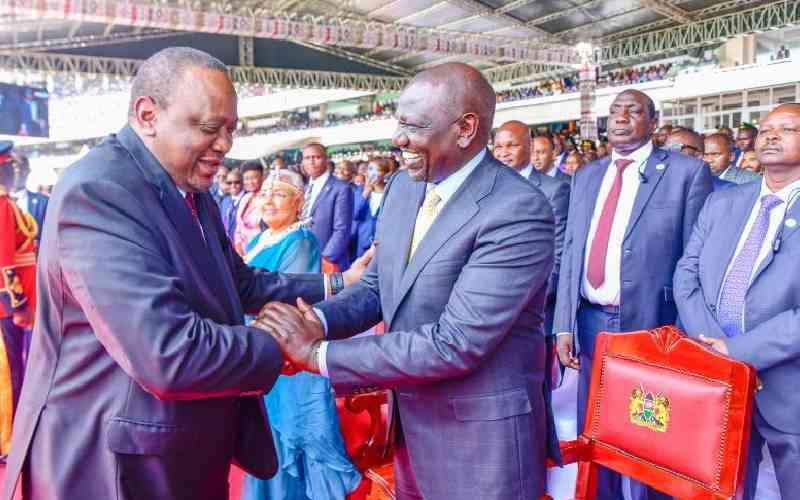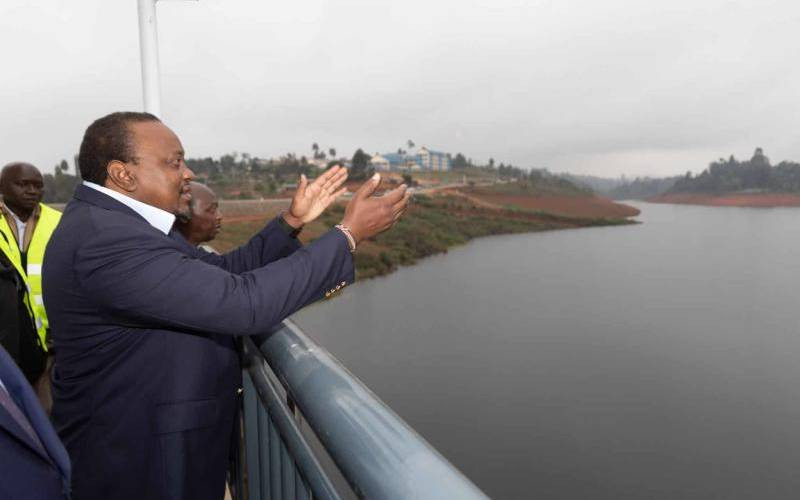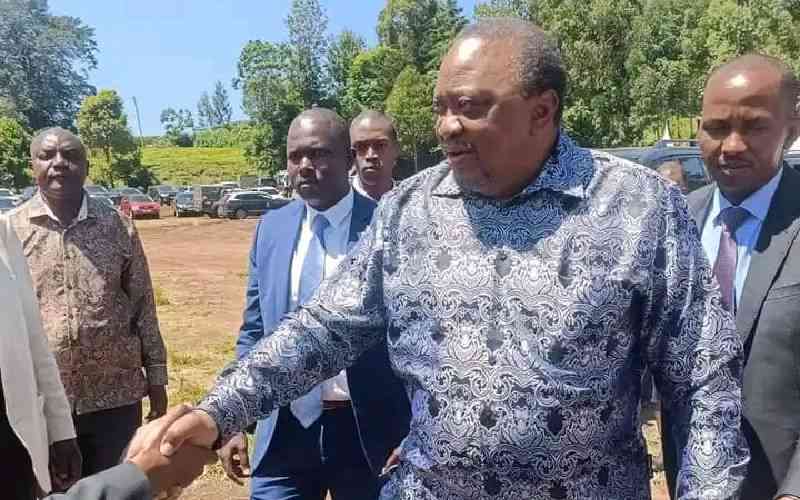By Oscar Obonyo
Deputy Prime Minister Uhuru Kenyatta has been on a roll since his new political outfit, The National Alliance (TNA) party, bagged two of three parliamentary seats in the recent by-elections. And besides being the biggest beneficiary of current wave of defections, his approval ratings, according to the latest opinion poll, have also improved.
What confounds many is how the political stature of a greenhorn who was nominated to Parliament in 2001, after failing to capture the Gatundu South seat in the 1997 General Election, has grown immensely.
Indeed, there is no doubt that the more experienced politicians are awed by the amateurish one-finger saluting politician of 2002, who was tagged a “political project”, for being singled out by retired President Moi as his preferred successor.
So what exactly has since changed, to the extent that Uhuru is today a serious presidential contender and critical player in the President Kibaki succession? Is it his family name or political support he enjoys from his populous Kikuyu community, which have propelled the son of Kenya’s first President Jomo Kenyatta, into significance?
ICC charges
Or could it be sympathy following charges levelled against him at International Criminal Courts (ICC) for allegedly fanning post-election violence? Alternatively, is Uhuru’s popularity rising because he is simply a likeable individual or serious political strategist, now reaping fruits of his labour?
Former Cabinet minister Amukowa Anangwe attributes Uhuru’s rising fortunes to three factors – his ethnic background, political leadership vacuum in central Kenya, and the politician’s financial might.
According to Prof Anangwe, who teaches political science at University of Dodoma, Tanzania, Uhuru is the hero of the moment among voters in central Kenya because “he is the only serious option available”.
“With regard to local challenge, the gods are with him. Consider this – there is no Prof George Saitoti (who died in a helicopter crash in June), President Kibaki is proceeding on retirement, Kenneth Matiba has since sunk into oblivion, while (Martha) Karua and (Peter) Kenneth have totally failed in impact,” says Anangwe.
But it is Uhuru’s perceived deep pockets, which the former Butere MP points out as the biggest asset to the TNA presidential aspirant: “The golden rule of elective politics is simple. That he, who has the gold, rules.”
Youth Affairs and Sports Minister Ababu Namwamba believes Uhuru has been riding on the tribal card to build political support, a factor that he fears could balkanise the country and “take us back to the dark experiences of 2007”.
“Although he has misused tribe as his political springboard, one must also give accolade to him because lately he is doing fairly well in trying to reach out to the rest of the country,” says Namwamba.
The minister singles out Uhuru’s campaign in Ndhiwa in the recent parliamentary by-elections, where he assured voters he would support Raila’s presidency if the PM won. Raila equally reciprocated Uhuru’s gesture a day later in Murang’a by stating likewise.
“Uhuru’s recent statements have been reflective of the factor that Kenya is bigger than his tribe or any other and if he continues with this trend then would be seeing an emerging leader who has freed himself from tribal chains,” he says.
Stay informed. Subscribe to our newsletter
System’s boy
Behind the façade of a tribal leader and “system’s boy”, those in the know say Uhuru is perhaps the most underestimated politician. They claim he is a schemer per excellence, who has been working on his presidential bid over the last five years.
Unlike his challengers, The Standard On Sunday, has established that Uhuru’s presidential bid team has been at it from the day Kibaki was controversially sworn-in as President.
Joseph Magutt, a political science lecturer at Kenyatta University, says Uhuru started his campaigns and mending his image in earnest immediately after his 2002 presidential debacle. Magutt says Uhuru’s rise has been on course since he unshackled himself from the shadow of retired President Moi.
In a calculated investment central Kenya region, Uhuru followed it up by abandoning his ambition in support of Kibaki’s bid instead. He made history in the process by being the first opposition leader in Kenya to drop his quest for presidency in favour of the incumbent.
And after the polls, Uhuru has been focused on his main challenger – PM Raila Odinga – on whom he has consistently targeted to diminish his clout. ODM operatives have claimed that from the word go, Uhuru schemed to pluck away Raila’s deputies in the party – deputy premier Musalia Mudavadi and Eldoret North MP William Ruto.
Came to pass
“Ruto was the first to leave and at this point some of Uhuru’s aides even swore to us that Mudavadi was next. This, too, came to pass,” says an aide of the PM, who declined to be named.
Although Uhuru’s allies have since refuted claims of involvement in wooing Mudavadi out of ODM, they were on the forefront in welcoming him to his new party United Democratic Forum. Some like Sports Assistant minister Kabando wa Kabando, have since abandoned Mudavadi for TNA.
If indeed Mudavadi’s exit is attributable to Uhuru’s machinations, then it is perhaps the most politically prudent move. It has not only weakened ODM’s original hold on Western, but dealt a blow to the Luhya-Luo electoral “conspiracy” in urban centres.
With Raila-Mudavadi and possibly ethnic support blocs going separate ways in Nairobi, for instance, TNA is expected to have a huge advantage in city politics.
Already, the latest opinion poll shows TNA has a slight edge over ODM, with 39 per cent support as opposed to the latter’s 38.
Back home in Central, Uhuru is coming out as an efficient politician. He has declined to enter into pacts with so-called friendly parties such as Safina, Grand National Union and Sisi Kwa Sisi.
His message, even to the seasoned politicians like Energy minister Kiraitu Murungi has been that, “either join TNA or get treated as rival party”.
In the meantime, Uhuru’s arithmetic remains incomplete, though. Observers have pointed at Justice and Constitutional Affairs Minister Eugene Wamalwa, as an appropriate and possible choice.
However, Wamalwa says he is running a separate presidential campaign on a New Ford-Kenya ticket. He, however, does rule out the possibility of teaming up with the Gatundu South MP.
“We have signed an MoU, alongside (former minister, Raphael) Tuju’s Party of Action to work with TNA. Constitutional provisions allow us to have a pre or post-election working arrangement, although at the moment we are building our campaigns separately,” says the minister, who maintains he will be on the presidential ballot paper.
 The Standard Group Plc is a
multi-media organization with investments in media platforms spanning newspaper
print operations, television, radio broadcasting, digital and online services. The
Standard Group is recognized as a leading multi-media house in Kenya with a key
influence in matters of national and international interest.
The Standard Group Plc is a
multi-media organization with investments in media platforms spanning newspaper
print operations, television, radio broadcasting, digital and online services. The
Standard Group is recognized as a leading multi-media house in Kenya with a key
influence in matters of national and international interest.
 The Standard Group Plc is a
multi-media organization with investments in media platforms spanning newspaper
print operations, television, radio broadcasting, digital and online services. The
Standard Group is recognized as a leading multi-media house in Kenya with a key
influence in matters of national and international interest.
The Standard Group Plc is a
multi-media organization with investments in media platforms spanning newspaper
print operations, television, radio broadcasting, digital and online services. The
Standard Group is recognized as a leading multi-media house in Kenya with a key
influence in matters of national and international interest.








